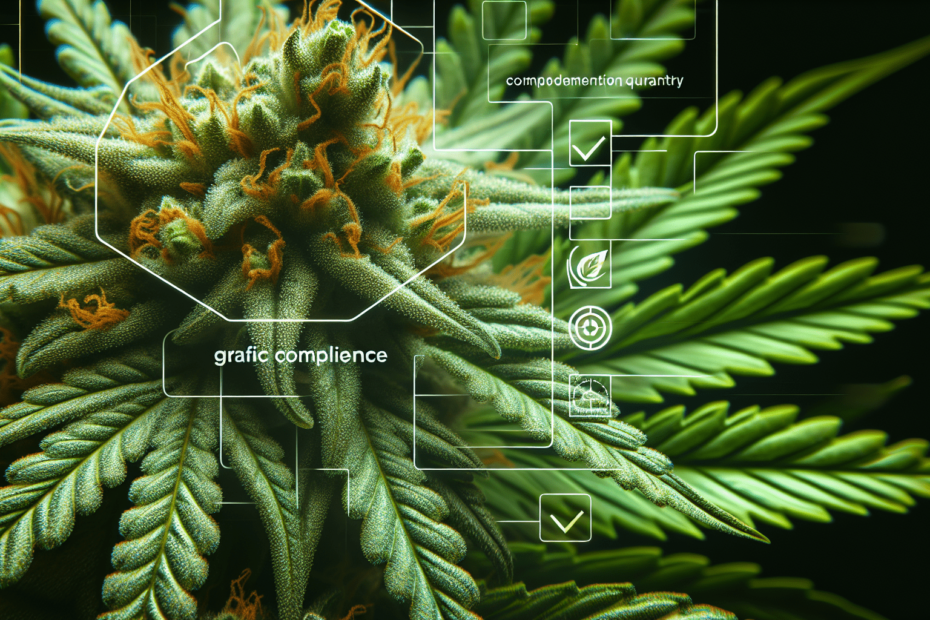So, you’ve probably heard by now that the cannabis industry is booming, with more and more countries legalizing its use for both medical and recreational purposes. But have you ever stopped to wonder why compliance is so crucial in this rapidly growing industry? Well, let me tell you. As the cannabis sector continues to gain legitimacy, it also faces a plethora of regulations and requirements that must be followed to ensure the safety and well-being of consumers, as well as maintain the credibility of the industry itself. In this article, we’ll explore the importance of compliance in the cannabis industry and why it should be at the forefront of every cannabis business owner’s mind.
Legal and Regulatory Framework
Licensing and Permits
Compliance with licensing and permit requirements is essential in the cannabis industry. Obtaining the necessary licenses and permits ensures that your business operates within the legal boundaries set by the state and federal governments. Failure to comply with these requirements can result in severe penalties, including fines, legal action, and even the revocation of your license. By adhering to licensing and permit regulations, you can establish your business as a reputable and trustworthy entity within the industry.
Compliance with State and Federal Laws
Complying with state and federal laws is paramount for the success and longevity of your cannabis business. State laws govern the cultivation, processing, and distribution of cannabis products, while federal laws continue to classify cannabis as a Schedule I controlled substance. Despite the conflict between state and federal laws, it is crucial to navigate the legal landscape carefully and ensure that you are in full compliance. Staying updated on the latest regulatory changes and working closely with legal experts can help you mitigate legal risks and ensure the stability and legitimacy of your operations.
Local Regulations
In addition to state and federal laws, it is essential to understand and comply with local regulations in the jurisdictions where you operate. Each locality may have its own unique rules and restrictions regarding the cannabis industry, such as zoning requirements, operational limitations, and licensing processes. Failing to adhere to these local regulations can result in significant setbacks and hinder your ability to operate smoothly. By familiarizing yourself with the local regulations and maintaining compliance, you can position your business for success within the specific communities you serve.
Quality Control and Product Safety
Ensuring Product Purity
Product purity is of utmost importance in the cannabis industry. Consumers rely on the quality and safety of the products they purchase, and maintaining product purity builds trust and credibility with your customer base. Robust quality control measures, such as thorough testing for contaminants and conducting stringent quality assurance procedures, are vital for ensuring product purity. By adhering to these standards, you can provide consistent and reliable products that meet or exceed consumer expectations.
Testing and Lab Standards
To ensure the safety and integrity of cannabis products, rigorous testing and adherence to lab standards must be implemented. Testing protocols help identify potential contaminants, potency levels, and ensure accurate labeling. Utilizing certified labs with experienced professionals and utilizing standardized testing methodologies are key elements in maintaining compliance and producing safe cannabis products. These standards are not only essential for consumer protection but also demonstrate your commitment to providing safe and reliable products.
Product Labeling and Packaging
Compliance with product labeling and packaging regulations is crucial for consumer protection and transparency. Clear and accurate labeling ensures that consumers have access to information such as potency, ingredients, and proper usage instructions. Additionally, proper packaging helps prevent unauthorized access, tampering, and protects the product from degradation. By adhering to these regulations, you demonstrate your commitment to consumer safety and empower consumers to make informed choices about the cannabis products they purchase.

Health and Safety
Safe Handling and Storage of Cannabis
Promoting health and safety in the cannabis industry involves implementing proper protocols for the handling and storage of cannabis products. This includes following best practices for storing and transporting cannabis to prevent contamination, deterioration, or exposure to unauthorized individuals. By establishing comprehensive protocols and training employees on safe handling techniques, you can minimize the risk of accidents, ensure consistent product quality, and protect the well-being of your employees and customers.
Preventing Contamination and Cross-Contamination
Preventing contamination and cross-contamination is crucial in maintaining product safety and consumer trust. Strict protocols should be in place to prevent the introduction of foreign substances, such as pesticides, heavy metals, or pathogens, during cultivation, processing, and packaging. Regular inspections and adherence to Good Manufacturing Practices (GMP) can help identify and address potential sources of contamination, ensuring that the end products are safe for consumption. By prioritizing contamination prevention, you demonstrate your commitment to producing high-quality and safe cannabis products.
Workplace Safety for Employees
Ensuring workplace safety is not only a legal requirement but also a moral responsibility. Implementing comprehensive safety protocols, providing appropriate training, and maintaining a safe working environment protect your employees from injuries, accidents, and occupational hazards. This includes implementing ergonomic practices, proper ventilation systems, and promoting a culture of safety awareness. By prioritizing workplace safety, you create a positive and productive work environment, attract and retain talented employees, and reduce the risk of legal liabilities associated with workplace injuries.
Consumer Protection
Accurate Product Information
Accurate product information is critical for consumer protection and informed decision-making. Transparent and honest product labeling, including clear ingredient lists, potency information, and dosage guidelines, allows consumers to make educated choices based on their preferences and needs. Providing accurate information builds trust with consumers and fosters a positive relationship between your business and its customers. By prioritizing accurate product information, you demonstrate your commitment to consumer safety and satisfaction.
Adherence to Product Restrictions
Complying with product restrictions, such as age limitations and dosage limitations, is essential for consumer protection and regulatory compliance. Ensuring that your products are appropriately packaged, labeled, and marketed helps prevent access by minors and ensures that consumers are using cannabis products responsibly. By strictly adhering to these restrictions, you contribute to the overall well-being and safety of the community while avoiding potential legal and reputational risks.
Protection against Misleading Claims
Misleading claims can harm consumers and damage the reputation of the cannabis industry as a whole. It is essential to ensure that your marketing and advertising materials provide accurate and truthful information about your products. Avoid making unsubstantiated claims about the health benefits or effectiveness of your products, as this can mislead consumers and undermine trust. By prioritizing honesty and transparency in your marketing efforts, you uphold consumer protection and contribute to the credibility of the cannabis industry.

Financial Accountability and Transparency
Tax Compliance
Complying with tax regulations is essential for financial accountability and maintaining good standing with tax authorities. The cannabis industry is subject to unique tax requirements, including excise taxes, local taxes, and state regulations. Staying informed about tax obligations, maintaining accurate records, and working closely with tax professionals can help you navigate these complexities and ensure compliance. By fulfilling your tax obligations, you contribute to the financial stability of your business and demonstrate your commitment to acting as a responsible industry participant.
Transparent Financial Reporting
Transparent financial reporting is crucial for maintaining the trust of stakeholders, attracting investors, and demonstrating integrity within the cannabis industry. Accurate and thorough financial reports provide insight into the financial health of your business and help stakeholders make informed decisions. Implementing proper accounting practices, conducting regular audits, and following Generally Accepted Accounting Principles (GAAP) can help ensure transparent and reliable financial reporting. By prioritizing transparency, you foster confidence in your business operations and contribute to the overall credibility of the cannabis industry.
Preventing Money Laundering and Illicit Activities
The cannabis industry is vulnerable to money laundering and illicit activities due to its cash-intensive nature and historical lack of access to traditional banking services. Implementing robust anti-money laundering (AML) protocols, conducting due diligence on business partners, and working with financial institutions that specialize in cannabis banking can help prevent illicit activities and protect your business from reputational and legal risks. By prioritizing financial accountability and compliance, you contribute to the legitimacy and professionalism of the cannabis industry.
Environmental Sustainability
Responsible Cultivation Practices
Responsible cultivation practices are essential for minimizing the environmental impact of the cannabis industry. Implementing sustainable and eco-friendly cultivation methods, such as organic farming, water conservation techniques, and integrated pest management, can help reduce resource consumption and environmental pollution. By prioritizing responsible cultivation practices, you contribute to the preservation of natural resources, promote sustainable agriculture, and meet the growing demand for environmentally conscious products.
Efficient Energy and Water Use
Efficient energy and water use in cannabis operations are crucial for minimizing the industry’s carbon footprint. Implementing energy-efficient technologies, such as LED lighting and HVAC systems, and utilizing water-saving techniques, such as drip irrigation, can significantly reduce energy and water consumption. By prioritizing efficient resource usage, you contribute to the overall sustainability of the cannabis industry, reduce operational costs, and demonstrate your commitment to environmental stewardship.
Proper Waste Management
Proper waste management is vital for minimizing the environmental impact of cannabis operations. Establishing waste management protocols that prioritize recycling, composting, and responsible disposal of byproducts help reduce landfill waste and prevent potential contamination. Additionally, complying with regulations regarding hazardous waste and implementing appropriate storage and handling procedures ensure the safe and responsible management of waste. By prioritizing proper waste management practices, you contribute to a cleaner environment, showcase your commitment to sustainability, and avoid potential legal and reputational risks.

Risk Mitigation
Complying with Security and Surveillance Requirements
Complying with security and surveillance requirements is crucial for risk mitigation in the cannabis industry. Comprehensive security systems, including video surveillance, access control, and alarm systems, help prevent unauthorized access, theft, and diversion of cannabis products. Implementing robust protocols for inventory management and record-keeping further enhances operational security and regulatory compliance. By prioritizing security and surveillance, you protect your business assets, uphold regulatory requirements, and minimize the risk of criminal activities.
Minimizing Legal and Reputational Risks
Minimizing legal and reputational risks is essential for the long-term success and sustainability of your cannabis business. This involves maintaining compliance with laws and regulations, adhering to ethical business practices, and avoiding activities that may tarnish your reputation. Conducting thorough due diligence on business partners, keeping informed about changes in the legal landscape, and working closely with legal experts can help identify and mitigate potential risks. By prioritizing risk mitigation, you safeguard your business from potential pitfalls and position yourself as a trusted and reliable industry participant.
Insurance and Risk Management Strategies
Insurance and risk management strategies are vital tools for protecting your cannabis business from unexpected events and liabilities. Working with insurance providers that specialize in the cannabis industry can help you identify and obtain the appropriate types of coverage, such as product liability insurance, general liability insurance, and business interruption insurance. Additionally, implementing risk management strategies, such as contingency planning and emergency response protocols, can help you mitigate the impact of unforeseen events. By prioritizing insurance and risk management, you protect your business assets, ensure continuity of operations, and provide peace of mind for stakeholders.
Social Responsibility
Promoting Responsible Cannabis Use
Promoting responsible cannabis use is a key aspect of social responsibility in the industry. Providing education and resources to consumers about safe usage, potential risks, and responsible consumption practices can help prevent misuse and promote positive experiences. Collaborating with healthcare professionals, organizations, and community stakeholders can further enhance efforts to promote responsible cannabis use and address any potential public health concerns. By prioritizing responsible cannabis use, you contribute to the well-being of consumers and foster positive attitudes towards the industry.
Contributing to the Community
Contributing to the community is an essential component of social responsibility in the cannabis industry. Engaging in philanthropic initiatives, supporting local organizations, and giving back to the communities you operate in help build strong and positive relationships. Consider sponsoring local events, providing job opportunities, or supporting social causes that align with your business values. By actively contributing to the community, you demonstrate that your business is invested in the well-being and prosperity of the areas it serves.
Supporting Social Equity and Inclusion
Supporting social equity and inclusion is crucial for fostering a fair and equitable cannabis industry. Historically, certain communities have been disproportionately affected by cannabis prohibition and the war on drugs. Taking proactive steps to promote diversity within your workforce and business partnerships, supporting social equity programs, and providing opportunities for underrepresented groups can help address these disparities. By prioritizing social equity and inclusion, you contribute to a more equitable industry and actively work towards rectifying past injustices.
Professionalism and Industry Credibility
Maintaining Ethical Standards
Maintaining ethical standards is essential for building professionalism and industry credibility. Upholding integrity, honesty, and transparency in all aspects of your business operations promotes trust and fosters positive relationships with stakeholders. This includes treating employees fairly, engaging in ethical sourcing and supply chain practices, and maintaining business practices that align with legal and ethical guidelines. By prioritizing ethical standards, you establish yourself as a reputable and trustworthy industry participant, attracting customers, partners, and investors who value ethical conduct.
Building Trust with Stakeholders
Building trust with stakeholders is crucial for the long-term success and growth of your cannabis business. This includes establishing open lines of communication, providing accurate and timely information, and actively addressing any concerns or feedback. By delivering on promises, meeting quality and safety standards, and being responsive to customer needs, you build strong relationships and foster loyalty. By prioritizing trust-building efforts, you create a positive reputation within the industry, increase customer satisfaction, and attract long-term partnerships and collaborations.
Nurturing a Positive Image for the Industry
Nurturing a positive image for the cannabis industry is essential for overcoming stigma and misconceptions. Actively engaging in educational initiatives, promoting responsible usage, and advocating for evidence-based policies help change public perception and shape a positive narrative around cannabis. By positioning your business as a responsible and ethical industry leader, you contribute to the overall improvement of the industry’s image and create an environment that supports its long-term growth and acceptance.
International Trade and Compliance
Import and Export Regulations
Navigating import and export regulations is crucial for businesses involved in international trade within the cannabis industry. Each country has its own set of regulations and restrictions regarding the import and export of cannabis and related products. As the industry continues to evolve globally, it is essential to stay informed about these regulations and work with legal experts to ensure compliance. By understanding and adhering to import and export regulations, you can seize international opportunities while avoiding potential legal and regulatory pitfalls.
Compliance with International Treaties
Compliance with international treaties is important for businesses engaged in global cannabis trade. Treaties such as the Single Convention on Narcotic Drugs establish international frameworks for the control and regulation of narcotics, including cannabis. Ensuring compliance with these treaties is vital to avoid violating international law and damaging diplomatic relations. By understanding and respecting international treaties, you contribute to the harmonization of global cannabis regulations and facilitate legitimate international trade within the industry.
Navigating Global Market Requirements
Navigating global market requirements is essential for businesses looking to expand their footprint beyond domestic borders. Each market has its own unique regulations, product standards, and consumer preferences. Conducting thorough market research, understanding cultural nuances, and adapting your products and marketing strategies accordingly can help you successfully navigate global market requirements. By prioritizing global market requirements, you position your business for international success and contribute to the growth and maturation of the global cannabis industry.
In conclusion, compliance is crucial in the cannabis industry due to the complex legal landscape, the need for consumer protection, financial accountability, sustainable practices, risk mitigation, social responsibility, professionalism, and international trade considerations. By embracing and prioritizing compliance in all aspects of your cannabis business, you can ensure its long-term success, contribute to the credibility and acceptance of the industry, and deliver safe and high-quality products to consumers around the world.
